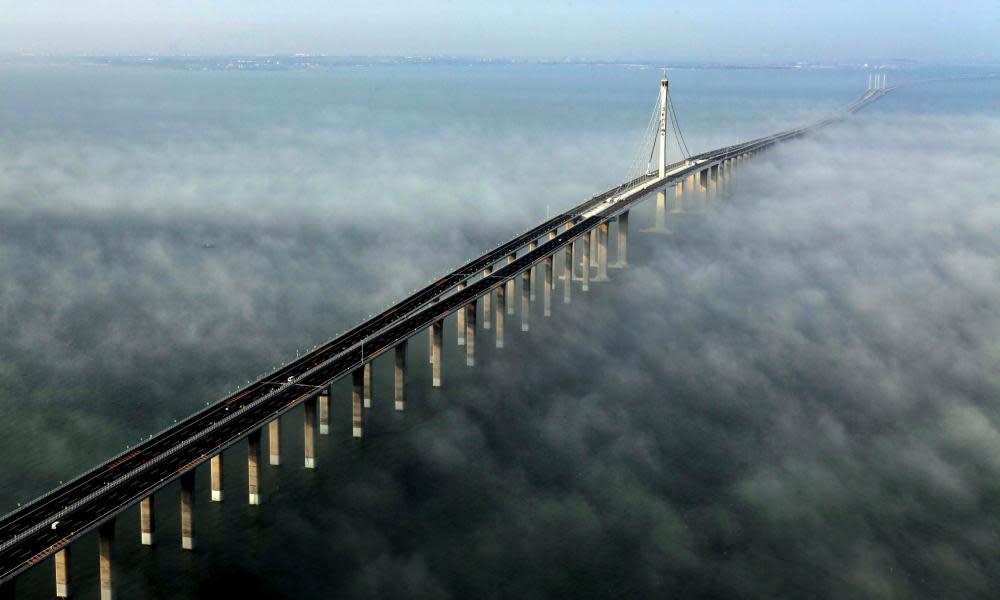Experts, industry and PM pour cold water on Boris Johnson's bridge

As ideas go, it has not been a resounding success. Architects, hauliers, the maritime industry, and an MP have so far expressed their scepticism about Boris Johnson’s ambition to build a 22-mile (35km) bridge across the Channel - and even the prime minister has signalled it won’t happen.
The foreign secretary proposed the idea on Thursday, telling the French president that it was “ridiculous” that two of the world’s biggest economies were joined only by a single railway line and later tweeting a picture of the two giving a thumbs-up.
En marche ! Great meetings with French counterparts today pic.twitter.com/D73B1rSkd3
— Boris Johnson (@BorisJohnson) January 18, 2018
But on Friday, Downing Street swiftly poured cold water on the idea. Pressed several times on whether the prime minister was open to a cross-Channel bridge, Theresa May’s spokesman said there were “no specific plans”.
“What was agreed yesterday, and I think that’s what the foreign secretary tweeted about as well, is a panel of experts who will look at major projects together including infrastructure,” he said.
That dismissal of the prospect will be seen as a snub for Johnson, who has championed a number of ambitious infrastructure projects that have failed to see the light of day.
No 10’s apparent bemusement at his latest suggestion was matched with reservations elsewhere, including from the UK Chamber of Shipping, which represents more than 180 maritime industry bodies.
“Building a huge concrete structure in the middle of the world’s busiest shipping lane might come with some challenges,” it tweeted, though the body might be expected to take a dim view of any potential maritime obstruction in the Channel.
Building a huge concrete structure in the middle of the world’s busiest shipping lane might come with some challenges. https://t.co/jYD5O8B19W
— UK Shipping (@ukshipping) January 18, 2018
The chamber’s chief executive, Guy Platten, said: “It’s good to have vision, particularly with respect to transport infrastructure projects, but the Dover Strait is the world’s busiest shipping lane. Many, many hundreds of vessel transits are made each day by commercial shipping, fishing and pleasure craft.
“Building a 22-mile-long bridge across the Channel would be a huge construction project, especially as the largest ships currently transiting the strait have a height above the water line in excess of 70 metres.
“Shipping moves 95% of the UK’s trade – it is vital that its movement remains as frictionless as possible, without disruption of any kind. The government and the EU should concentrate on keeping trade moving freely through our ports, which is in the economic interest of both sides of the Channel.”
The Road Haulage Association said the costs and practical implications of a bridge across the Channel would be “enormous”. Its chief executive, Richard Burnett, said: “We’re better off spending smaller amounts of money on improving our crumbling roads and opening more lorry parks.
“The Strait of Dover … carries more than 500 ships daily, so construction would cause huge disruption to sea traffic. And what of the impact on the road network and people of Kent?
“The Channel tunnel and the ferry routes are working well within capacity, so it makes no sense to commit huge amounts of taxpayer’s money in an uncertain economic climate to a costly bridge project that we don’t need.”
Johnson’s Conservative colleague Charlie Elphicke, the MP for Dover, said cash should be invested in Kent instead. “Boris is right. We absolutely must invest in infrastructure to keep trade flowing between Britain and France,” he said.
“Let’s start by dualling the A2 to Dover, and building the Lower Thames Crossing and lorry parks on the M20. Surely it’s not a bridge too far for the government to invest in Kent.”
Engineers, however, have said the idea of a Channel bridge is not as far-fetched as it may seem. Alan Dunlop, who teaches architecture at the University of Liverpool, referred to the new 34-mile sea bridge linking Hong Kong and Macau, which cost £12bn. It is yet to open to traffic.
“That’s without any regulation, processes, health and safety and using Chinese workers,” he told the Times. “I’d say at least £120bn for a Channel bridge and that’s a conservative estimate. It would really be cheaper to mover France closer.”
Even the former Ukip leader Nigel Farage thought Johnson’s idea wide of the mark. He tweeted:
Boris' bonkers bridge sounds like a big waste of money. Dangerous for container ships and useless when the wind blows (which is often)!
— Nigel Farage (@Nigel_Farage) January 19, 2018
Bridge designer Ian Firth, a former president of the Institution of Structural Engineers, told BBC Radio 4’s Today programme: “It is entirely feasible. Before the tunnel was built there were bridge options being looked at.
“There are bridges of a similar, if not quite the same, scale elsewhere. Of course this would not be one big span; the economics may lean towards something like 800m to 1km spans. It would be a huge undertaking, but it would be absolutely possible, and shipping impact issues could be dealt with.”
The Strait of Dover is 20.7 miles (33.3km) and has an average depth of 45m (147ft).
Johnson has championed an array of ambitious infrastructure projects that have not come to fruition. As mayor of London, he opened the £60m Emirates Air Line cable car that has failed to attract hoped-for commuter traffic. He wanted an airport built in the Thames estuary, dubbed Boris Island, but the idea was dismissed as impractical and costly in comparison to expanding Heathrow. He also backed the construction of a garden bridge across the Thames in west London, which was ditched by his successor as mayor, Sadiq Khan, for not offering value for money.

 Yahoo News
Yahoo News 
